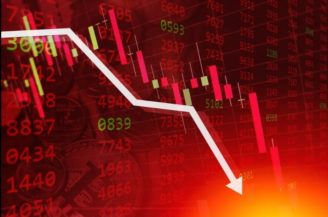📉 Introduction
Global stock markets witnessed a sharp downturn this week after a dramatic crash in China’s stock market sent shockwaves across international exchanges. The plunge has raised serious concerns about global economic stability, investor sentiment, and the interconnectedness of world markets.

🇨🇳 What Happened in China?
The Shanghai Composite Index and the Shenzhen Component Index fell by over 8% in a single day, triggered by a combination of:
- Slower-than-expected GDP growth
- Massive real estate defaults (including a major collapse of another developer post-Evergrande)
- Weak consumer demand and declining exports
- Regulatory uncertainty surrounding tech and AI sectors
This marks one of the worst single-day crashes in Chinese stock market history since 2015.
🌐 Global Ripple Effect
Within hours, markets across Asia, Europe, and the Americas began reacting:
Asian Markets:
- Nikkei 225 (Japan): -3.2%
- Hang Seng (Hong Kong): -5.6%
- Kospi (South Korea): -2.9%
European Markets:
- FTSE 100 (UK): -2.5%
- DAX (Germany): -3.1%
- CAC 40 (France): -2.7%
U.S. Markets:
- Dow Jones Industrial Average: -1.9%
- S&P 500: -2.3%
- Nasdaq Composite: -2.6%
Investors worldwide rushed to safe-haven assets like gold, U.S. treasuries, and the dollar.
📊 Table: Market Performance Summary
| Region | Index | Drop (%) |
|---|---|---|
| China | Shanghai Composite | -8.1% |
| Hong Kong | Hang Seng | -5.6% |
| Japan | Nikkei 225 | -3.2% |
| South Korea | Kospi | -2.9% |
| UK | FTSE 100 | -2.5% |
| Germany | DAX | -3.1% |
| France | CAC 40 | -2.7% |
| USA | S&P 500 | -2.3% |
| USA | Nasdaq Composite | -2.6% |
🧠 Expert Reactions
- Bloomberg: “The Chinese economy is showing signs of deep structural weakness. This may not be a one-off event.”
- Goldman Sachs: “The crash reflects systemic fears and a liquidity crunch in Chinese markets.”
- RBI Economist: “India is relatively insulated, but foreign fund outflows could increase temporarily.”
🇮🇳 What This Means for Indian Markets
- Sensex and Nifty both fell by more than 1.5%, driven by FII (Foreign Institutional Investor) selloffs.
- Sectors hit hardest include IT, auto, and metals due to global exposure.
- However, domestic demand and policy stability are likely to cushion the blow longer term.
🔍 Should You Be Worried?
Short-Term:
- Expect high volatility and cautious investor sentiment.
- Tech and export-heavy companies may take a hit.
Long-Term:
- Diversified portfolios and quality stocks may weather the storm.
- Long-term investors should avoid panic selling and focus on fundamentals.
🧭 Conclusion
The China-led global market decline is a reminder of how interconnected today’s economies are. While short-term market jitters may continue, the event also presents opportunities for disciplined investors who can ride out volatility with a long-term view.

